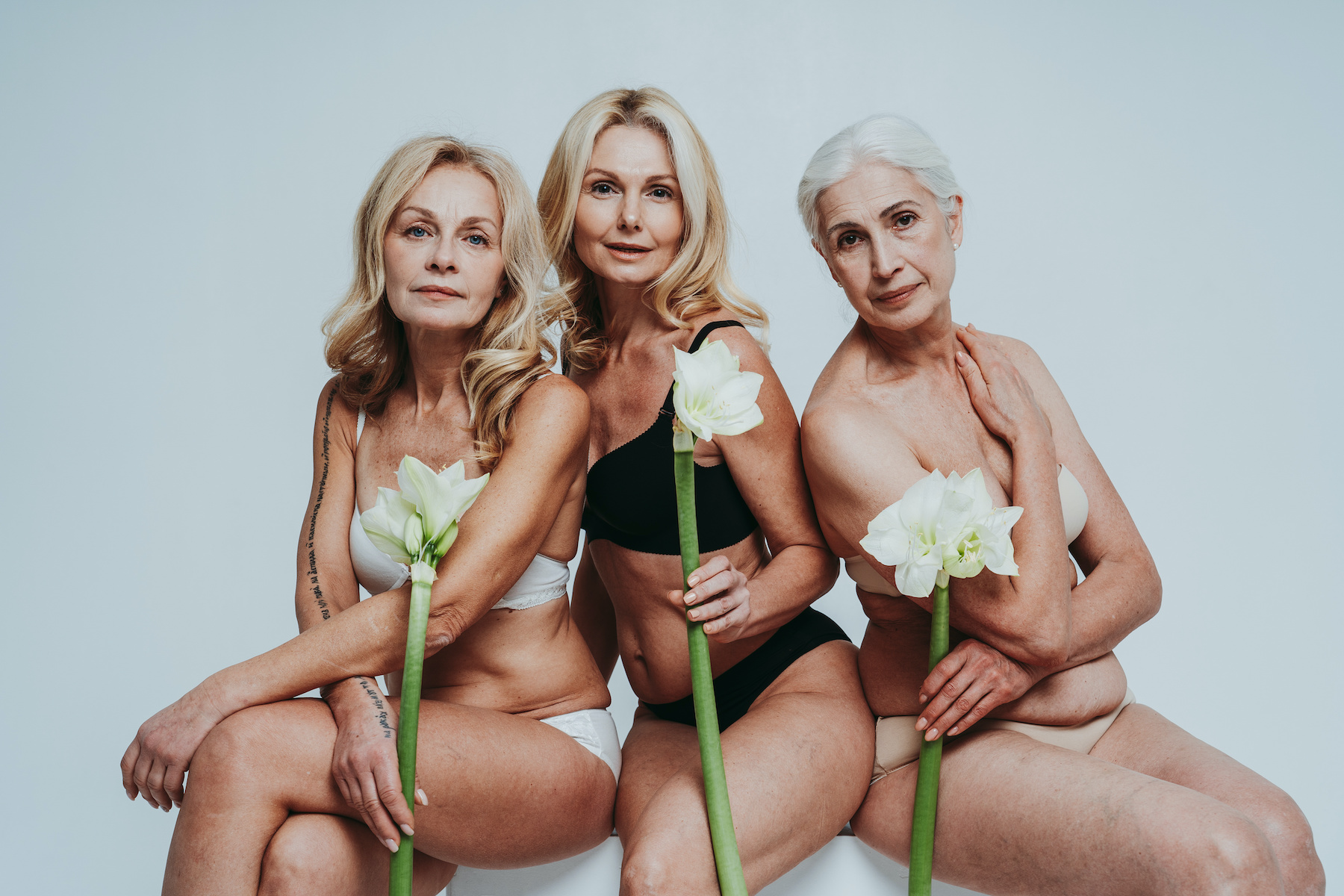- You are here :
The menopause: what impact on sex life?

- Published on : 28-03-23
- Category :
This article deals with the subject of positive, consensual sexuality. Whatever the stage of life, everyone has the right to choose how to live their sexuality. We'll look at the question of desired sexuality after the menopause. This does not exclude the fact that some people do not desire sexuality after the menopause, which is entirely understandable, if the wishes of the people in question are taken into account.
A study from the University of Pittsburg , led by Dr Holly Thomas, shows that sexuality can be enjoyable after forty. In fact, ageing even offers certain advantages (e.g. women may feel more confident and comfortable in their own skin as they pass the age of forty).
Having a satisfying sex life requires, among other things, a good level of self-esteem and feeling wanted and loved. Mature women have a better understanding of their bodies and how they work, and can accept their sexuality as they discover it. They also know what gives them sexual pleasure and dare to share it with their partner. At the menopause, women may be better able to communicate their sexual needs to their partners than when they were younger, and in their fifties they may feel freer in the bedroom.
The menopause is defined as the definitive cessation of menstruation for at least 12 months, during which time the ovaries no longer produce oestrogen and pregnancy is no longer physiologically possible. Hormonal changes are just one part of the menopause, but they cannot be ignored. Some women may experience one or more symptoms of the menopause, such as hot flushes, vaginal dryness, weight gain, loss of libido, possible pain during vaginal penetration, irritability, night sweats, mood swings, and so on. It is also important to pay attention to mental health and acceptance of this period of life, which can sometimes have more disadvantages than advantages, not to mention cases of natural premature menopause, chromosomal abnormalities or menopause caused by chemotherapy. Whatever its nature, the menopause can be experienced differently by each woman and each couple.
Hormones are part of our sex life, but sexual function is also influenced by biological factors (i.e. genes, hormones and the complexity of the nervous system) and non-biological factors (i.e. family background, beliefs, symbols). In addition, sexuality involves values and beliefs, experiences, social status, personal characteristics and social attitudes. The main components of sexuality are sensuality, intimacy, relationships, sexual identity and sexual health.
The menopause is part of ageing, which is a natural process, and there can also be positive changes in terms of sexuality:
- For women who had painful sexual encounters caused by endometriosis or other reasons, the menopause can bring relief, allowing them to fully enjoy their sexual encounters.
- At the menopause, women no longer have to worry about getting pregnant and no longer need to use contraception (although they should always use condoms when starting new relationships, to avoid sexually transmitted infections).
- Older couples may find it easier to find time for intimacy and love as their children grow up and leave home.
Whatever her age, a woman who feels wanted will continue to be wanted. A woman's partner can also play a very important role when she reaches the menopause, understanding and supporting her as she goes through all these biological changes. Women can experience a loss of libido at different stages of their lives, such as pregnancy, miscarriage, childbirth and the menopause.
Women aged between 40 and 60, for whom sexuality has always been important, may continue to be sexually active when they reach the menopause. The experts in this study say that, in general, if a woman's sex life is enjoyable before she reaches forty, she will find ways to enjoy it after forty. This stage of life should be characterised by quality intimacy, in the form of tender, sensual or sexual physical contact. As the philosopher Seneca said, "it is quality rather than quantity that counts".
That said, shared interests increase closeness between partners as they take part in activities together. Couples can try new hobbies (such as cooking classes, painting, hiking or travelling) that will bring them closer together by sharing the same experience.
Happy couples in their fifties accept ageing and can make the most of it. Healthy sexuality does not necessarily mean penetrative intercourse: oral sex and masturbation (as a couple or individually) can also be satisfying, and experimentation plays an important role in sexuality at the menopause. We can't expect to have the same sex life at 60 as we did at 20. Our preferences and even our taste buds change every seven years. Sexuality is no exception, and we can boost it by adapting our sex lives according to our stage in life.
Couples can create more intimacy through physical contact, which can be tender, sensual or sexual. Being physically affectionate feels good and releases oxytocin, the attachment hormone. Physical affection should not be limited to sexual intercourse. Small gestures such as holding hands or hugging make it easier to bond with your partner.
Authentic communication is important for a healthy relationship. Being able to talk about themselves brings partners closer together. Encouraging your partner to share their thoughts goes hand in hand with accepting what they share, even if it's hard to hear. You need to be sure that the other person will accept and appreciate all these thoughts and feelings.
Another important thing to bear in mind is that it's highly likely that the partner is also going through physiological changes. Women are not the only ones to go through this period, and it's a personal decision as well as a shared one as to how your sex life will unfold at the menopause, whether it's a continuum, a break or a discovery of sexuality.
If sexuality is important to you and you find that it is affected by the menopause, talk to your doctor or a sexologist, as solutions do exist. Strengthening your perineum muscles is very important, as is using a lubricant that suits you.
Gynaecologist MD Gass says that "the quality of the relationship is very important when it comes to the female libido". If a woman enjoys being close to her partner in ways other than having sex, this can boost her libido. Shannon Chavez, psychologist and sex therapist, also points out that "a woman's libido is constantly changing, not just during the menopause", but "sexual intimacy, whether it's sensual play or kissing and caressing, can improve it".


